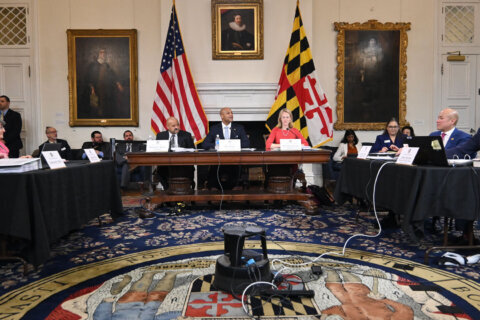SILVER SPRING, Md. (AP) — A federal appeals court on Tuesday upheld Maryland’s decade-old ban on military-style firearms commonly referred to as assault weapons.
A majority of 4th U.S. Circuit Court of Appeals judges rejected gun rights groups’ arguments that Maryland’s 2013 law is unconstitutional under the Second Amendment.
The U.S. Supreme Court declined to review this case in May, when the full 4th Circuit was still considering it. Maryland officials argued the Supreme Court should defer to the lower court before taking any action, but the plaintiffs said the appeals court was taking too long to rule.
Maryland passed the sweeping gun-control measure after a 20-year-old gunman killed 20 children and six adults at Sandy Hook Elementary School in Connecticut in 2012. It bans dozens of firearms — including the AR-15, the AK-47 and the Barrett .50-caliber sniper rifle — and puts a 10-round limit on gun magazines.
The Firearms Policy Coalition Inc., one of the plaintiffs challenging Maryland’s law, said it would again ask the Supreme Court to review the case.
“Our objective is simple: End all bans on so-called ‘assault weapons’ nationwide. And we look forward to doing just that,” coalition president Brandon Combs said in a statement.
The 4th Circuit’s full roster of judges agreed to consider the case after a three-judge panel heard oral arguments but hadn’t yet issued a ruling.
The weapons banned by Maryland’s law fall outside Second Amendment protection because they are essentially military-style weapons “designed for sustained combat operations that are ill-suited and disproportionate to the need for self-defense,” Judge J. Harvie Wilkinson III wrote in the court’s majority opinion.
“Moreover, the Maryland law fits comfortably within our nation’s tradition of firearms regulation,” Wilkinson wrote. “It is but another example of a state regulating excessively dangerous weapons once their incompatibility with a lawful and safe society becomes apparent, while nonetheless preserving avenues for armed self-defense.”
Eight other 4th Circuit judges joined Wilkinson’s majority opinion. Five other judges from the Virginia-based appeals court joined in a dissenting opinion.
The law’s opponents argue it’s unconstitutional because such weapons are already in common use. In his dissenting opinion, Judge Julius Richardson said the court’s majority “misconstrues the nature of the banned weapons to demean their lawful functions and exaggerate their unlawful uses.”
“The Second Amendment is not a second-class right subject to the whimsical discretion of federal judges. Its mandate is absolute and, applied here, unequivocal,” Richardson wrote.
Wilkinson said the dissenting judges are in favor of “creating a near absolute Second Amendment right in a near vacuum,” striking “a profound blow to the basic obligation of government to ensure the safety of the governed.
“Arms upon arms would be permitted in what can only be described as a stampede toward the disablement of our democracy in these most dangerous of times,” Wilkinson wrote.
Maryland Attorney General Anthony Brown praised the court’s decision.
“The Court’s decision today will save lives,” Brown said in a statement. “Access to weapons of war that have no place in our communities causes senseless and preventable deaths.”
The latest challenge to the assault weapons ban comes under consideration following a 2022 U.S. Supreme Court decision that “effected a sea change in Second Amendment law.” That 6-3 decision signified a major expansion of gun rights following a series of mass shootings.
With its conservative justices in the majority and liberals in dissent, the court struck down a New York law and said Americans have a right to carry firearms in public for self-defense. It also required gun policies to fall in line with the country’s “historical tradition of firearm regulation.”
The 4th Circuit previously declared the ban constitutional in a 2017 ruling, saying the guns banned under Maryland’s law aren’t protected by the Second Amendment.
“Put simply, we have no power to extend Second Amendment protections to weapons of war,” Judge Robert King wrote for the court in that majority opinion, calling the law “precisely the type of judgment that legislatures are allowed to make without second-guessing by a court.”
The court heard oral arguments in the latest challenge in March. It’s one of two cases on gun rights out of Maryland that the federal appeals court took up around the same time. The other is a challenge to Maryland’s handgun licensing requirements.
Separately, a federal judge last week ruled that a 2023 Maryland law can’t prohibit licensed gun owners from carrying firearms in bars and restaurants and in private buildings without the owner’s permission. However, Chief U.S. District Judge George Russell upheld other gun restrictions in the state law. Those include bans on carrying firearms in health care facilities, schools, government buildings, amusement parks, mass transit facilities, race tracks, casinos, museums, state parks and stadiums.
Maryland lawmakers approved the law last year in response to the U.S. Supreme Court decision that struck down a New York law that was very similar to Maryland’s “good and substantial reason” standard for permits to carry concealed handguns.
___
Skene reported from Baltimore. Associated Press reporter Brian Witte in Annapolis, Maryland, contributed.
Copyright © 2024 The Associated Press. All rights reserved. This material may not be published, broadcast, written or redistributed.







